Leadership and Management Styles in Marriott: A Detailed Analysis
VerifiedAdded on 2022/12/29
|16
|4287
|231
Report
AI Summary
This report provides a comprehensive analysis of leadership and management within the service industry, using Marriott as a case study. It begins with an introduction to leadership and management concepts and their significance in the service sector, highlighting key areas such as administration, promotion, and customer service. The report then delves into classical management theories (scientific, bureaucratic, and human relations) and their practical applications within Marriott. It examines the roles of leaders, including influencer, decision-maker, coach, visionary, and change agent, and explores various leadership styles such as autocratic, democratic, transactional, transformational, and laissez-faire, as implemented by Marriott. Furthermore, the report analyzes internal and external factors influencing Marriott's management styles and structures, such as board of directors, organizational culture, and political/economic factors. It assesses current and future management and leadership skills, offering insights into how Marriott can adapt to the evolving demands of the service industry. The report concludes by comparing and contrasting Marriott's practices with other service industry organizations.
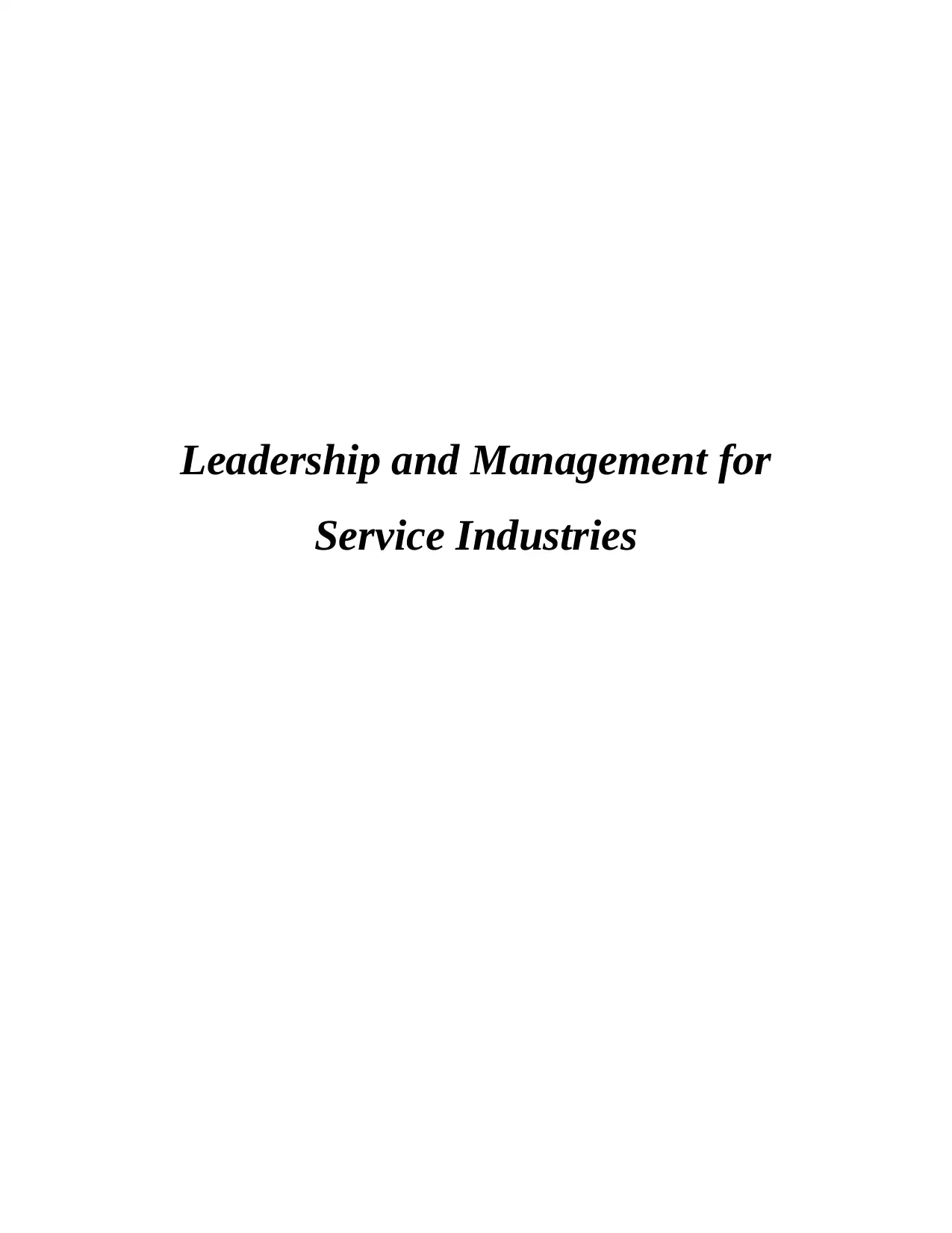
Leadership and Management for
Service Industries
Service Industries
Paraphrase This Document
Need a fresh take? Get an instant paraphrase of this document with our AI Paraphraser
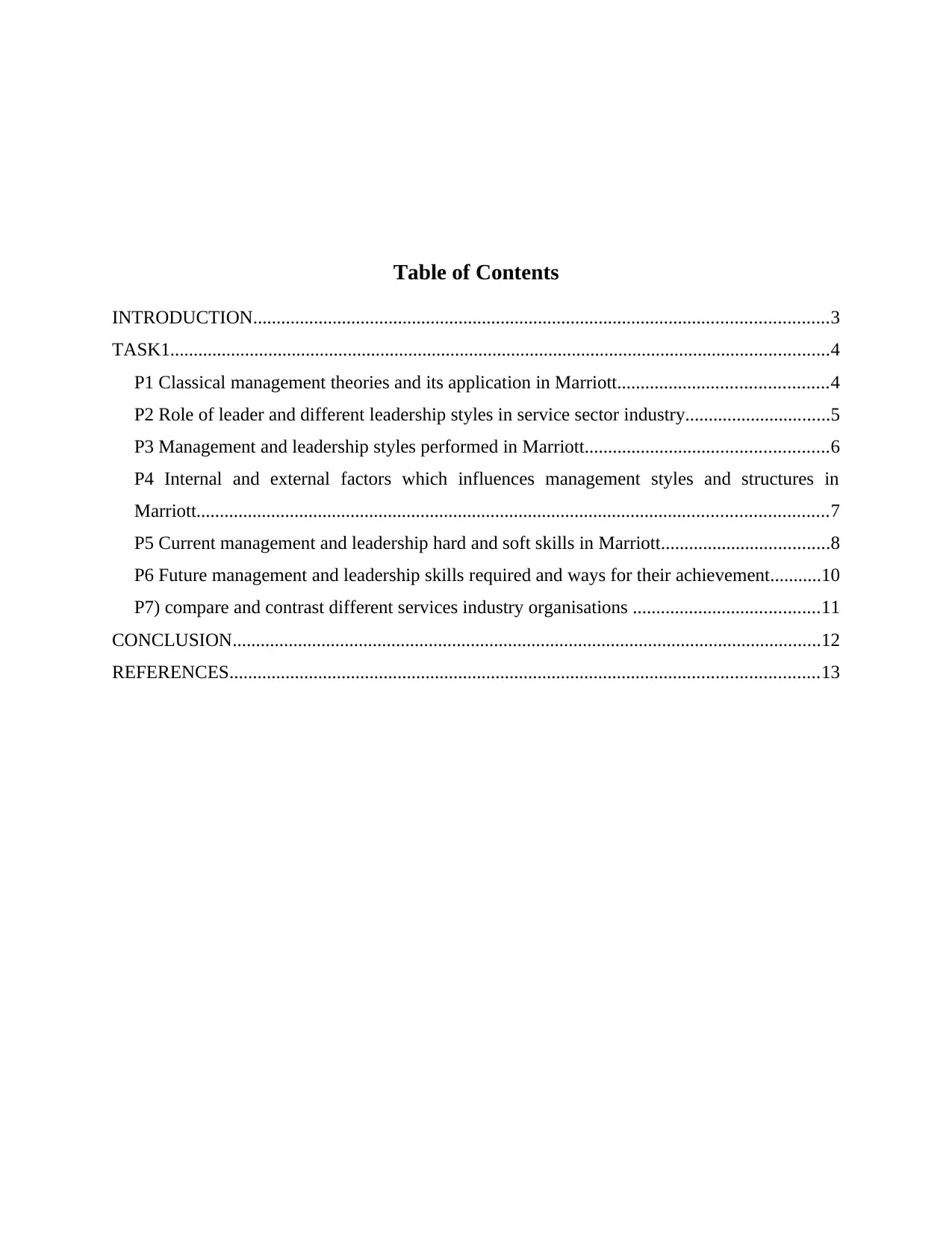
Table of Contents
INTRODUCTION...........................................................................................................................3
TASK1.............................................................................................................................................4
P1 Classical management theories and its application in Marriott.............................................4
P2 Role of leader and different leadership styles in service sector industry...............................5
P3 Management and leadership styles performed in Marriott....................................................6
P4 Internal and external factors which influences management styles and structures in
Marriott.......................................................................................................................................7
P5 Current management and leadership hard and soft skills in Marriott....................................8
P6 Future management and leadership skills required and ways for their achievement...........10
P7) compare and contrast different services industry organisations ........................................11
CONCLUSION..............................................................................................................................12
REFERENCES..............................................................................................................................13
INTRODUCTION...........................................................................................................................3
TASK1.............................................................................................................................................4
P1 Classical management theories and its application in Marriott.............................................4
P2 Role of leader and different leadership styles in service sector industry...............................5
P3 Management and leadership styles performed in Marriott....................................................6
P4 Internal and external factors which influences management styles and structures in
Marriott.......................................................................................................................................7
P5 Current management and leadership hard and soft skills in Marriott....................................8
P6 Future management and leadership skills required and ways for their achievement...........10
P7) compare and contrast different services industry organisations ........................................11
CONCLUSION..............................................................................................................................12
REFERENCES..............................................................................................................................13
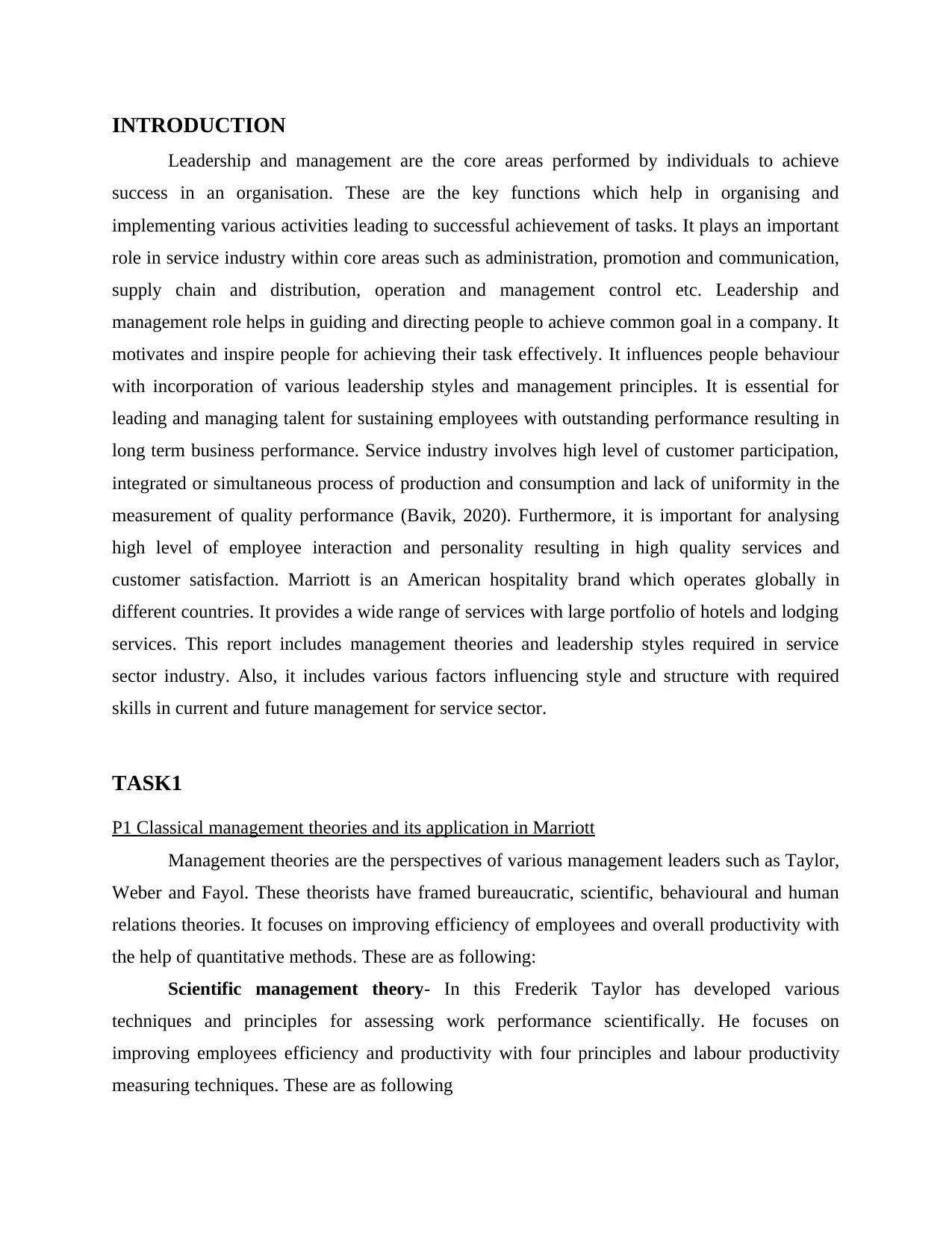
INTRODUCTION
Leadership and management are the core areas performed by individuals to achieve
success in an organisation. These are the key functions which help in organising and
implementing various activities leading to successful achievement of tasks. It plays an important
role in service industry within core areas such as administration, promotion and communication,
supply chain and distribution, operation and management control etc. Leadership and
management role helps in guiding and directing people to achieve common goal in a company. It
motivates and inspire people for achieving their task effectively. It influences people behaviour
with incorporation of various leadership styles and management principles. It is essential for
leading and managing talent for sustaining employees with outstanding performance resulting in
long term business performance. Service industry involves high level of customer participation,
integrated or simultaneous process of production and consumption and lack of uniformity in the
measurement of quality performance (Bavik, 2020). Furthermore, it is important for analysing
high level of employee interaction and personality resulting in high quality services and
customer satisfaction. Marriott is an American hospitality brand which operates globally in
different countries. It provides a wide range of services with large portfolio of hotels and lodging
services. This report includes management theories and leadership styles required in service
sector industry. Also, it includes various factors influencing style and structure with required
skills in current and future management for service sector.
TASK1
P1 Classical management theories and its application in Marriott
Management theories are the perspectives of various management leaders such as Taylor,
Weber and Fayol. These theorists have framed bureaucratic, scientific, behavioural and human
relations theories. It focuses on improving efficiency of employees and overall productivity with
the help of quantitative methods. These are as following:
Scientific management theory- In this Frederik Taylor has developed various
techniques and principles for assessing work performance scientifically. He focuses on
improving employees efficiency and productivity with four principles and labour productivity
measuring techniques. These are as following
Leadership and management are the core areas performed by individuals to achieve
success in an organisation. These are the key functions which help in organising and
implementing various activities leading to successful achievement of tasks. It plays an important
role in service industry within core areas such as administration, promotion and communication,
supply chain and distribution, operation and management control etc. Leadership and
management role helps in guiding and directing people to achieve common goal in a company. It
motivates and inspire people for achieving their task effectively. It influences people behaviour
with incorporation of various leadership styles and management principles. It is essential for
leading and managing talent for sustaining employees with outstanding performance resulting in
long term business performance. Service industry involves high level of customer participation,
integrated or simultaneous process of production and consumption and lack of uniformity in the
measurement of quality performance (Bavik, 2020). Furthermore, it is important for analysing
high level of employee interaction and personality resulting in high quality services and
customer satisfaction. Marriott is an American hospitality brand which operates globally in
different countries. It provides a wide range of services with large portfolio of hotels and lodging
services. This report includes management theories and leadership styles required in service
sector industry. Also, it includes various factors influencing style and structure with required
skills in current and future management for service sector.
TASK1
P1 Classical management theories and its application in Marriott
Management theories are the perspectives of various management leaders such as Taylor,
Weber and Fayol. These theorists have framed bureaucratic, scientific, behavioural and human
relations theories. It focuses on improving efficiency of employees and overall productivity with
the help of quantitative methods. These are as following:
Scientific management theory- In this Frederik Taylor has developed various
techniques and principles for assessing work performance scientifically. He focuses on
improving employees efficiency and productivity with four principles and labour productivity
measuring techniques. These are as following
⊘ This is a preview!⊘
Do you want full access?
Subscribe today to unlock all pages.

Trusted by 1+ million students worldwide
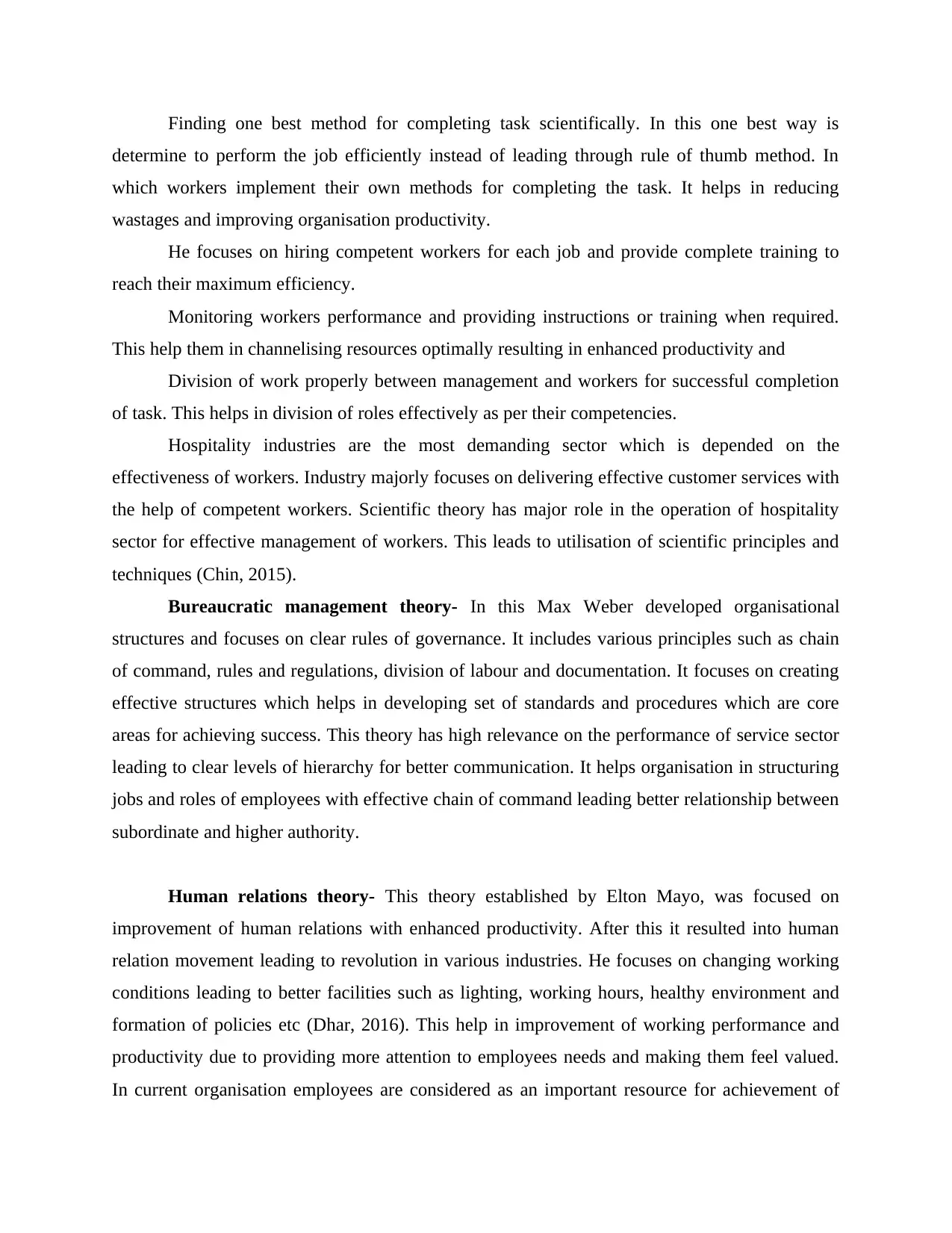
Finding one best method for completing task scientifically. In this one best way is
determine to perform the job efficiently instead of leading through rule of thumb method. In
which workers implement their own methods for completing the task. It helps in reducing
wastages and improving organisation productivity.
He focuses on hiring competent workers for each job and provide complete training to
reach their maximum efficiency.
Monitoring workers performance and providing instructions or training when required.
This help them in channelising resources optimally resulting in enhanced productivity and
Division of work properly between management and workers for successful completion
of task. This helps in division of roles effectively as per their competencies.
Hospitality industries are the most demanding sector which is depended on the
effectiveness of workers. Industry majorly focuses on delivering effective customer services with
the help of competent workers. Scientific theory has major role in the operation of hospitality
sector for effective management of workers. This leads to utilisation of scientific principles and
techniques (Chin, 2015).
Bureaucratic management theory- In this Max Weber developed organisational
structures and focuses on clear rules of governance. It includes various principles such as chain
of command, rules and regulations, division of labour and documentation. It focuses on creating
effective structures which helps in developing set of standards and procedures which are core
areas for achieving success. This theory has high relevance on the performance of service sector
leading to clear levels of hierarchy for better communication. It helps organisation in structuring
jobs and roles of employees with effective chain of command leading better relationship between
subordinate and higher authority.
Human relations theory- This theory established by Elton Mayo, was focused on
improvement of human relations with enhanced productivity. After this it resulted into human
relation movement leading to revolution in various industries. He focuses on changing working
conditions leading to better facilities such as lighting, working hours, healthy environment and
formation of policies etc (Dhar, 2016). This help in improvement of working performance and
productivity due to providing more attention to employees needs and making them feel valued.
In current organisation employees are considered as an important resource for achievement of
determine to perform the job efficiently instead of leading through rule of thumb method. In
which workers implement their own methods for completing the task. It helps in reducing
wastages and improving organisation productivity.
He focuses on hiring competent workers for each job and provide complete training to
reach their maximum efficiency.
Monitoring workers performance and providing instructions or training when required.
This help them in channelising resources optimally resulting in enhanced productivity and
Division of work properly between management and workers for successful completion
of task. This helps in division of roles effectively as per their competencies.
Hospitality industries are the most demanding sector which is depended on the
effectiveness of workers. Industry majorly focuses on delivering effective customer services with
the help of competent workers. Scientific theory has major role in the operation of hospitality
sector for effective management of workers. This leads to utilisation of scientific principles and
techniques (Chin, 2015).
Bureaucratic management theory- In this Max Weber developed organisational
structures and focuses on clear rules of governance. It includes various principles such as chain
of command, rules and regulations, division of labour and documentation. It focuses on creating
effective structures which helps in developing set of standards and procedures which are core
areas for achieving success. This theory has high relevance on the performance of service sector
leading to clear levels of hierarchy for better communication. It helps organisation in structuring
jobs and roles of employees with effective chain of command leading better relationship between
subordinate and higher authority.
Human relations theory- This theory established by Elton Mayo, was focused on
improvement of human relations with enhanced productivity. After this it resulted into human
relation movement leading to revolution in various industries. He focuses on changing working
conditions leading to better facilities such as lighting, working hours, healthy environment and
formation of policies etc (Dhar, 2016). This help in improvement of working performance and
productivity due to providing more attention to employees needs and making them feel valued.
In current organisation employees are considered as an important resource for achievement of
Paraphrase This Document
Need a fresh take? Get an instant paraphrase of this document with our AI Paraphraser
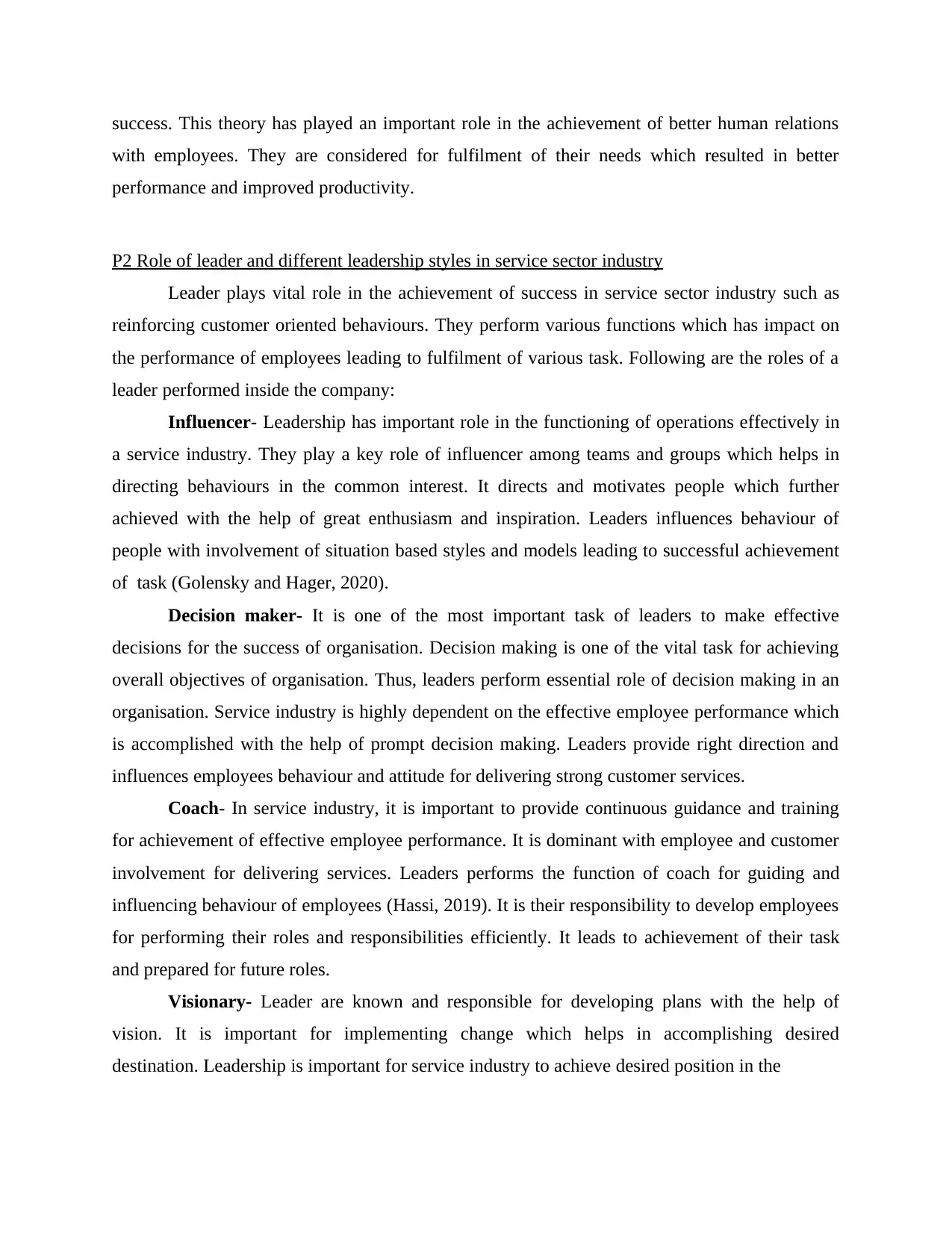
success. This theory has played an important role in the achievement of better human relations
with employees. They are considered for fulfilment of their needs which resulted in better
performance and improved productivity.
P2 Role of leader and different leadership styles in service sector industry
Leader plays vital role in the achievement of success in service sector industry such as
reinforcing customer oriented behaviours. They perform various functions which has impact on
the performance of employees leading to fulfilment of various task. Following are the roles of a
leader performed inside the company:
Influencer- Leadership has important role in the functioning of operations effectively in
a service industry. They play a key role of influencer among teams and groups which helps in
directing behaviours in the common interest. It directs and motivates people which further
achieved with the help of great enthusiasm and inspiration. Leaders influences behaviour of
people with involvement of situation based styles and models leading to successful achievement
of task (Golensky and Hager, 2020).
Decision maker- It is one of the most important task of leaders to make effective
decisions for the success of organisation. Decision making is one of the vital task for achieving
overall objectives of organisation. Thus, leaders perform essential role of decision making in an
organisation. Service industry is highly dependent on the effective employee performance which
is accomplished with the help of prompt decision making. Leaders provide right direction and
influences employees behaviour and attitude for delivering strong customer services.
Coach- In service industry, it is important to provide continuous guidance and training
for achievement of effective employee performance. It is dominant with employee and customer
involvement for delivering services. Leaders performs the function of coach for guiding and
influencing behaviour of employees (Hassi, 2019). It is their responsibility to develop employees
for performing their roles and responsibilities efficiently. It leads to achievement of their task
and prepared for future roles.
Visionary- Leader are known and responsible for developing plans with the help of
vision. It is important for implementing change which helps in accomplishing desired
destination. Leadership is important for service industry to achieve desired position in the
with employees. They are considered for fulfilment of their needs which resulted in better
performance and improved productivity.
P2 Role of leader and different leadership styles in service sector industry
Leader plays vital role in the achievement of success in service sector industry such as
reinforcing customer oriented behaviours. They perform various functions which has impact on
the performance of employees leading to fulfilment of various task. Following are the roles of a
leader performed inside the company:
Influencer- Leadership has important role in the functioning of operations effectively in
a service industry. They play a key role of influencer among teams and groups which helps in
directing behaviours in the common interest. It directs and motivates people which further
achieved with the help of great enthusiasm and inspiration. Leaders influences behaviour of
people with involvement of situation based styles and models leading to successful achievement
of task (Golensky and Hager, 2020).
Decision maker- It is one of the most important task of leaders to make effective
decisions for the success of organisation. Decision making is one of the vital task for achieving
overall objectives of organisation. Thus, leaders perform essential role of decision making in an
organisation. Service industry is highly dependent on the effective employee performance which
is accomplished with the help of prompt decision making. Leaders provide right direction and
influences employees behaviour and attitude for delivering strong customer services.
Coach- In service industry, it is important to provide continuous guidance and training
for achievement of effective employee performance. It is dominant with employee and customer
involvement for delivering services. Leaders performs the function of coach for guiding and
influencing behaviour of employees (Hassi, 2019). It is their responsibility to develop employees
for performing their roles and responsibilities efficiently. It leads to achievement of their task
and prepared for future roles.
Visionary- Leader are known and responsible for developing plans with the help of
vision. It is important for implementing change which helps in accomplishing desired
destination. Leadership is important for service industry to achieve desired position in the
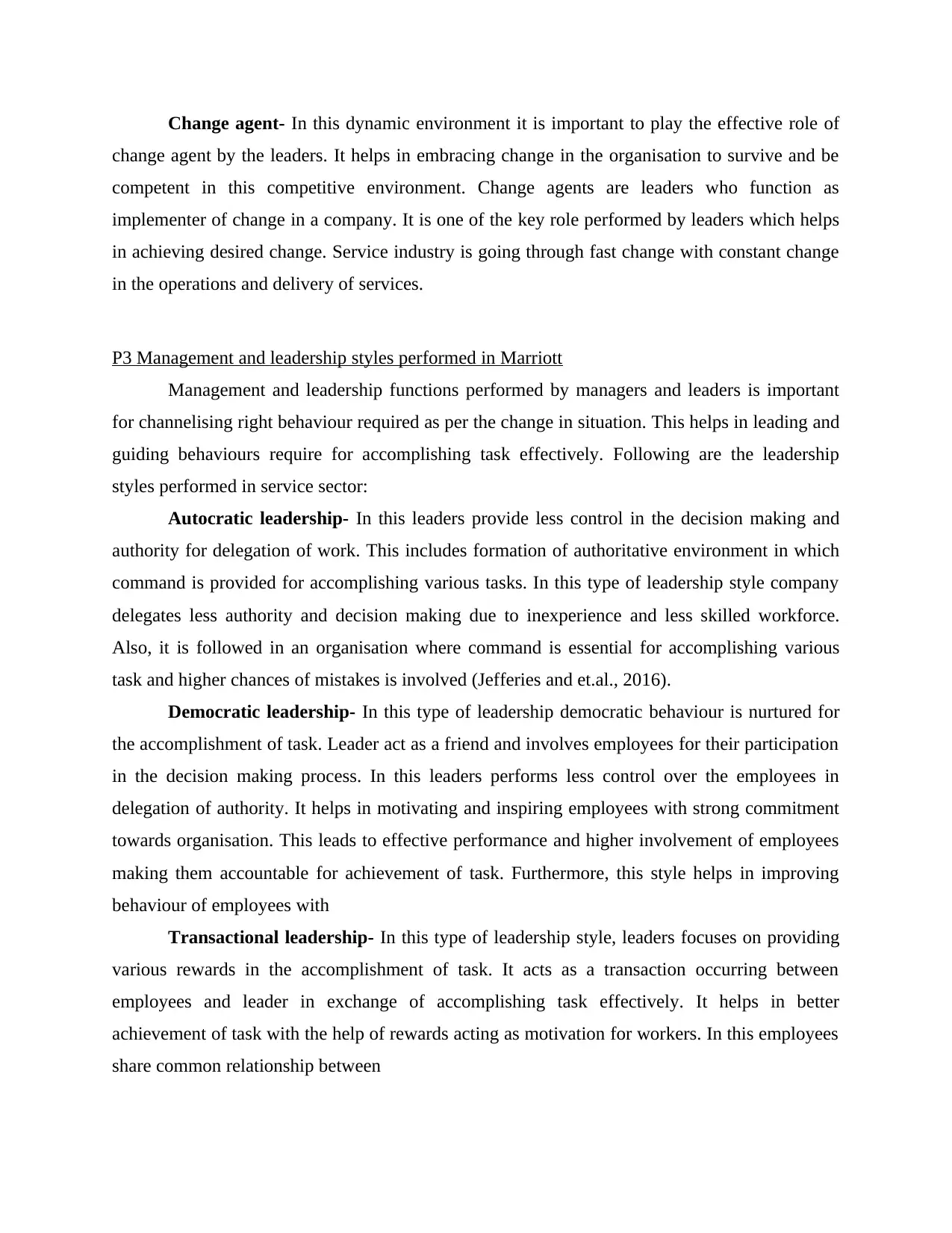
Change agent- In this dynamic environment it is important to play the effective role of
change agent by the leaders. It helps in embracing change in the organisation to survive and be
competent in this competitive environment. Change agents are leaders who function as
implementer of change in a company. It is one of the key role performed by leaders which helps
in achieving desired change. Service industry is going through fast change with constant change
in the operations and delivery of services.
P3 Management and leadership styles performed in Marriott
Management and leadership functions performed by managers and leaders is important
for channelising right behaviour required as per the change in situation. This helps in leading and
guiding behaviours require for accomplishing task effectively. Following are the leadership
styles performed in service sector:
Autocratic leadership- In this leaders provide less control in the decision making and
authority for delegation of work. This includes formation of authoritative environment in which
command is provided for accomplishing various tasks. In this type of leadership style company
delegates less authority and decision making due to inexperience and less skilled workforce.
Also, it is followed in an organisation where command is essential for accomplishing various
task and higher chances of mistakes is involved (Jefferies and et.al., 2016).
Democratic leadership- In this type of leadership democratic behaviour is nurtured for
the accomplishment of task. Leader act as a friend and involves employees for their participation
in the decision making process. In this leaders performs less control over the employees in
delegation of authority. It helps in motivating and inspiring employees with strong commitment
towards organisation. This leads to effective performance and higher involvement of employees
making them accountable for achievement of task. Furthermore, this style helps in improving
behaviour of employees with
Transactional leadership- In this type of leadership style, leaders focuses on providing
various rewards in the accomplishment of task. It acts as a transaction occurring between
employees and leader in exchange of accomplishing task effectively. It helps in better
achievement of task with the help of rewards acting as motivation for workers. In this employees
share common relationship between
change agent by the leaders. It helps in embracing change in the organisation to survive and be
competent in this competitive environment. Change agents are leaders who function as
implementer of change in a company. It is one of the key role performed by leaders which helps
in achieving desired change. Service industry is going through fast change with constant change
in the operations and delivery of services.
P3 Management and leadership styles performed in Marriott
Management and leadership functions performed by managers and leaders is important
for channelising right behaviour required as per the change in situation. This helps in leading and
guiding behaviours require for accomplishing task effectively. Following are the leadership
styles performed in service sector:
Autocratic leadership- In this leaders provide less control in the decision making and
authority for delegation of work. This includes formation of authoritative environment in which
command is provided for accomplishing various tasks. In this type of leadership style company
delegates less authority and decision making due to inexperience and less skilled workforce.
Also, it is followed in an organisation where command is essential for accomplishing various
task and higher chances of mistakes is involved (Jefferies and et.al., 2016).
Democratic leadership- In this type of leadership democratic behaviour is nurtured for
the accomplishment of task. Leader act as a friend and involves employees for their participation
in the decision making process. In this leaders performs less control over the employees in
delegation of authority. It helps in motivating and inspiring employees with strong commitment
towards organisation. This leads to effective performance and higher involvement of employees
making them accountable for achievement of task. Furthermore, this style helps in improving
behaviour of employees with
Transactional leadership- In this type of leadership style, leaders focuses on providing
various rewards in the accomplishment of task. It acts as a transaction occurring between
employees and leader in exchange of accomplishing task effectively. It helps in better
achievement of task with the help of rewards acting as motivation for workers. In this employees
share common relationship between
⊘ This is a preview!⊘
Do you want full access?
Subscribe today to unlock all pages.

Trusted by 1+ million students worldwide
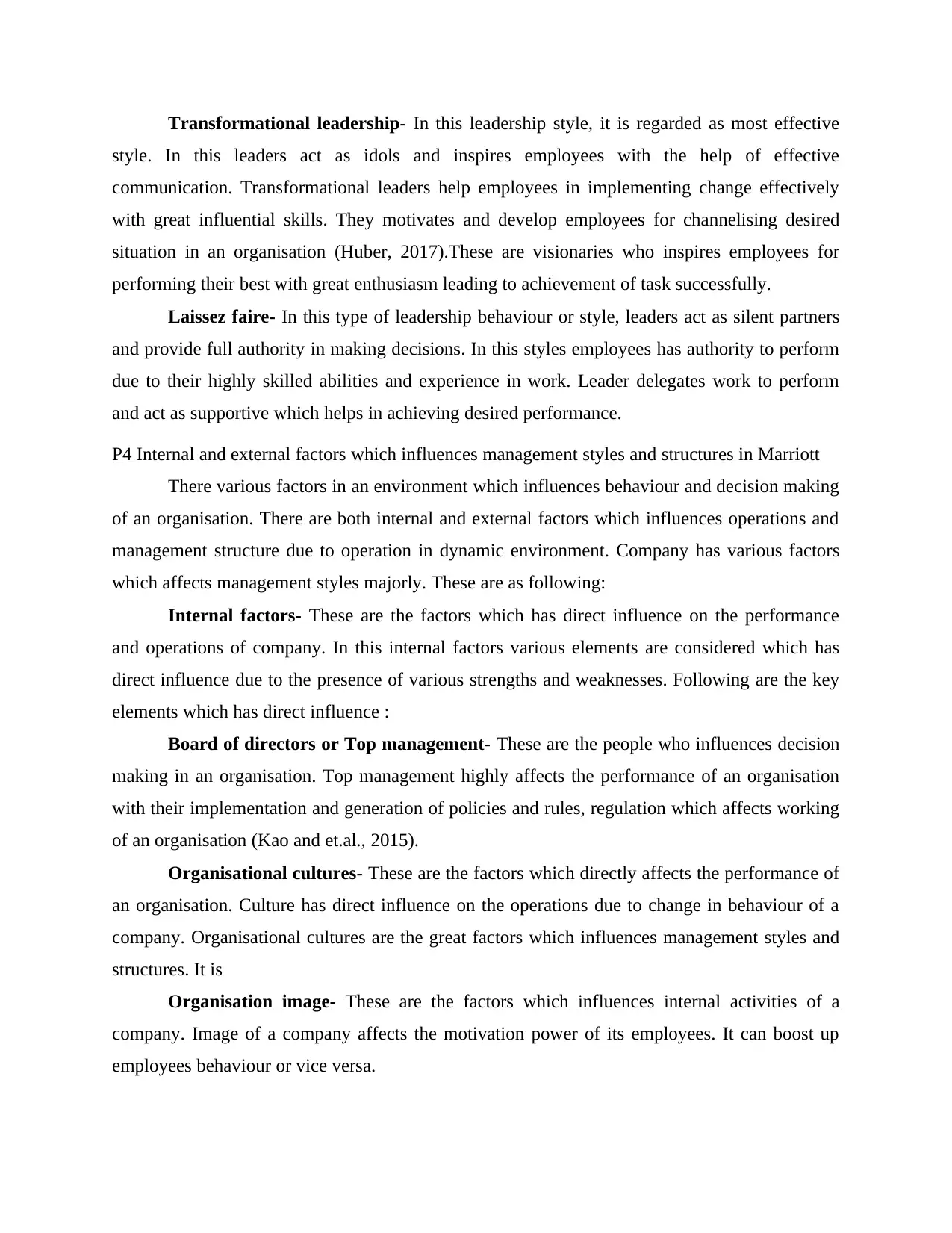
Transformational leadership- In this leadership style, it is regarded as most effective
style. In this leaders act as idols and inspires employees with the help of effective
communication. Transformational leaders help employees in implementing change effectively
with great influential skills. They motivates and develop employees for channelising desired
situation in an organisation (Huber, 2017).These are visionaries who inspires employees for
performing their best with great enthusiasm leading to achievement of task successfully.
Laissez faire- In this type of leadership behaviour or style, leaders act as silent partners
and provide full authority in making decisions. In this styles employees has authority to perform
due to their highly skilled abilities and experience in work. Leader delegates work to perform
and act as supportive which helps in achieving desired performance.
P4 Internal and external factors which influences management styles and structures in Marriott
There various factors in an environment which influences behaviour and decision making
of an organisation. There are both internal and external factors which influences operations and
management structure due to operation in dynamic environment. Company has various factors
which affects management styles majorly. These are as following:
Internal factors- These are the factors which has direct influence on the performance
and operations of company. In this internal factors various elements are considered which has
direct influence due to the presence of various strengths and weaknesses. Following are the key
elements which has direct influence :
Board of directors or Top management- These are the people who influences decision
making in an organisation. Top management highly affects the performance of an organisation
with their implementation and generation of policies and rules, regulation which affects working
of an organisation (Kao and et.al., 2015).
Organisational cultures- These are the factors which directly affects the performance of
an organisation. Culture has direct influence on the operations due to change in behaviour of a
company. Organisational cultures are the great factors which influences management styles and
structures. It is
Organisation image- These are the factors which influences internal activities of a
company. Image of a company affects the motivation power of its employees. It can boost up
employees behaviour or vice versa.
style. In this leaders act as idols and inspires employees with the help of effective
communication. Transformational leaders help employees in implementing change effectively
with great influential skills. They motivates and develop employees for channelising desired
situation in an organisation (Huber, 2017).These are visionaries who inspires employees for
performing their best with great enthusiasm leading to achievement of task successfully.
Laissez faire- In this type of leadership behaviour or style, leaders act as silent partners
and provide full authority in making decisions. In this styles employees has authority to perform
due to their highly skilled abilities and experience in work. Leader delegates work to perform
and act as supportive which helps in achieving desired performance.
P4 Internal and external factors which influences management styles and structures in Marriott
There various factors in an environment which influences behaviour and decision making
of an organisation. There are both internal and external factors which influences operations and
management structure due to operation in dynamic environment. Company has various factors
which affects management styles majorly. These are as following:
Internal factors- These are the factors which has direct influence on the performance
and operations of company. In this internal factors various elements are considered which has
direct influence due to the presence of various strengths and weaknesses. Following are the key
elements which has direct influence :
Board of directors or Top management- These are the people who influences decision
making in an organisation. Top management highly affects the performance of an organisation
with their implementation and generation of policies and rules, regulation which affects working
of an organisation (Kao and et.al., 2015).
Organisational cultures- These are the factors which directly affects the performance of
an organisation. Culture has direct influence on the operations due to change in behaviour of a
company. Organisational cultures are the great factors which influences management styles and
structures. It is
Organisation image- These are the factors which influences internal activities of a
company. Image of a company affects the motivation power of its employees. It can boost up
employees behaviour or vice versa.
Paraphrase This Document
Need a fresh take? Get an instant paraphrase of this document with our AI Paraphraser
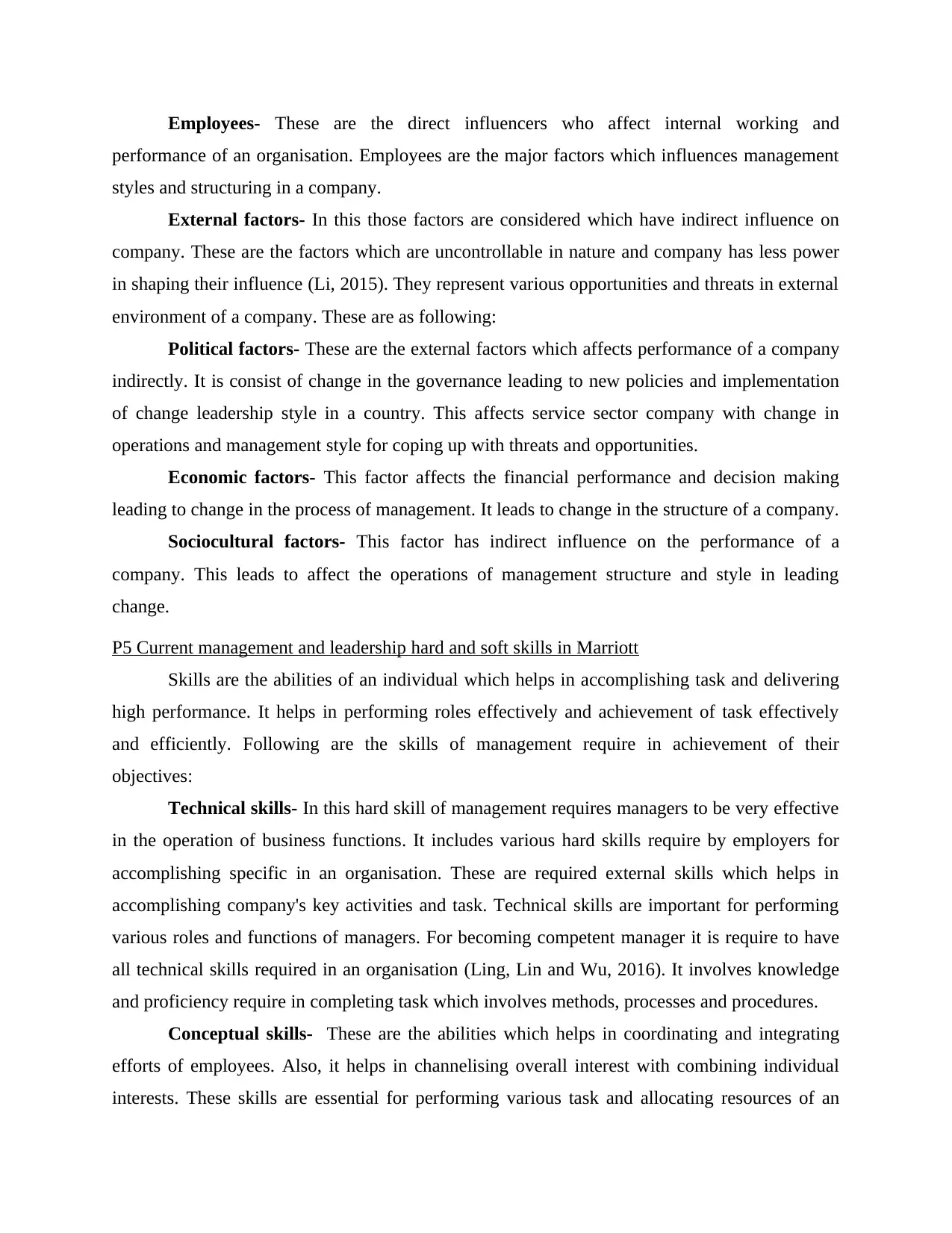
Employees- These are the direct influencers who affect internal working and
performance of an organisation. Employees are the major factors which influences management
styles and structuring in a company.
External factors- In this those factors are considered which have indirect influence on
company. These are the factors which are uncontrollable in nature and company has less power
in shaping their influence (Li, 2015). They represent various opportunities and threats in external
environment of a company. These are as following:
Political factors- These are the external factors which affects performance of a company
indirectly. It is consist of change in the governance leading to new policies and implementation
of change leadership style in a country. This affects service sector company with change in
operations and management style for coping up with threats and opportunities.
Economic factors- This factor affects the financial performance and decision making
leading to change in the process of management. It leads to change in the structure of a company.
Sociocultural factors- This factor has indirect influence on the performance of a
company. This leads to affect the operations of management structure and style in leading
change.
P5 Current management and leadership hard and soft skills in Marriott
Skills are the abilities of an individual which helps in accomplishing task and delivering
high performance. It helps in performing roles effectively and achievement of task effectively
and efficiently. Following are the skills of management require in achievement of their
objectives:
Technical skills- In this hard skill of management requires managers to be very effective
in the operation of business functions. It includes various hard skills require by employers for
accomplishing specific in an organisation. These are required external skills which helps in
accomplishing company's key activities and task. Technical skills are important for performing
various roles and functions of managers. For becoming competent manager it is require to have
all technical skills required in an organisation (Ling, Lin and Wu, 2016). It involves knowledge
and proficiency require in completing task which involves methods, processes and procedures.
Conceptual skills- These are the abilities which helps in coordinating and integrating
efforts of employees. Also, it helps in channelising overall interest with combining individual
interests. These skills are essential for performing various task and allocating resources of an
performance of an organisation. Employees are the major factors which influences management
styles and structuring in a company.
External factors- In this those factors are considered which have indirect influence on
company. These are the factors which are uncontrollable in nature and company has less power
in shaping their influence (Li, 2015). They represent various opportunities and threats in external
environment of a company. These are as following:
Political factors- These are the external factors which affects performance of a company
indirectly. It is consist of change in the governance leading to new policies and implementation
of change leadership style in a country. This affects service sector company with change in
operations and management style for coping up with threats and opportunities.
Economic factors- This factor affects the financial performance and decision making
leading to change in the process of management. It leads to change in the structure of a company.
Sociocultural factors- This factor has indirect influence on the performance of a
company. This leads to affect the operations of management structure and style in leading
change.
P5 Current management and leadership hard and soft skills in Marriott
Skills are the abilities of an individual which helps in accomplishing task and delivering
high performance. It helps in performing roles effectively and achievement of task effectively
and efficiently. Following are the skills of management require in achievement of their
objectives:
Technical skills- In this hard skill of management requires managers to be very effective
in the operation of business functions. It includes various hard skills require by employers for
accomplishing specific in an organisation. These are required external skills which helps in
accomplishing company's key activities and task. Technical skills are important for performing
various roles and functions of managers. For becoming competent manager it is require to have
all technical skills required in an organisation (Ling, Lin and Wu, 2016). It involves knowledge
and proficiency require in completing task which involves methods, processes and procedures.
Conceptual skills- These are the abilities which helps in coordinating and integrating
efforts of employees. Also, it helps in channelising overall interest with combining individual
interests. These skills are essential for performing various task and allocating resources of an
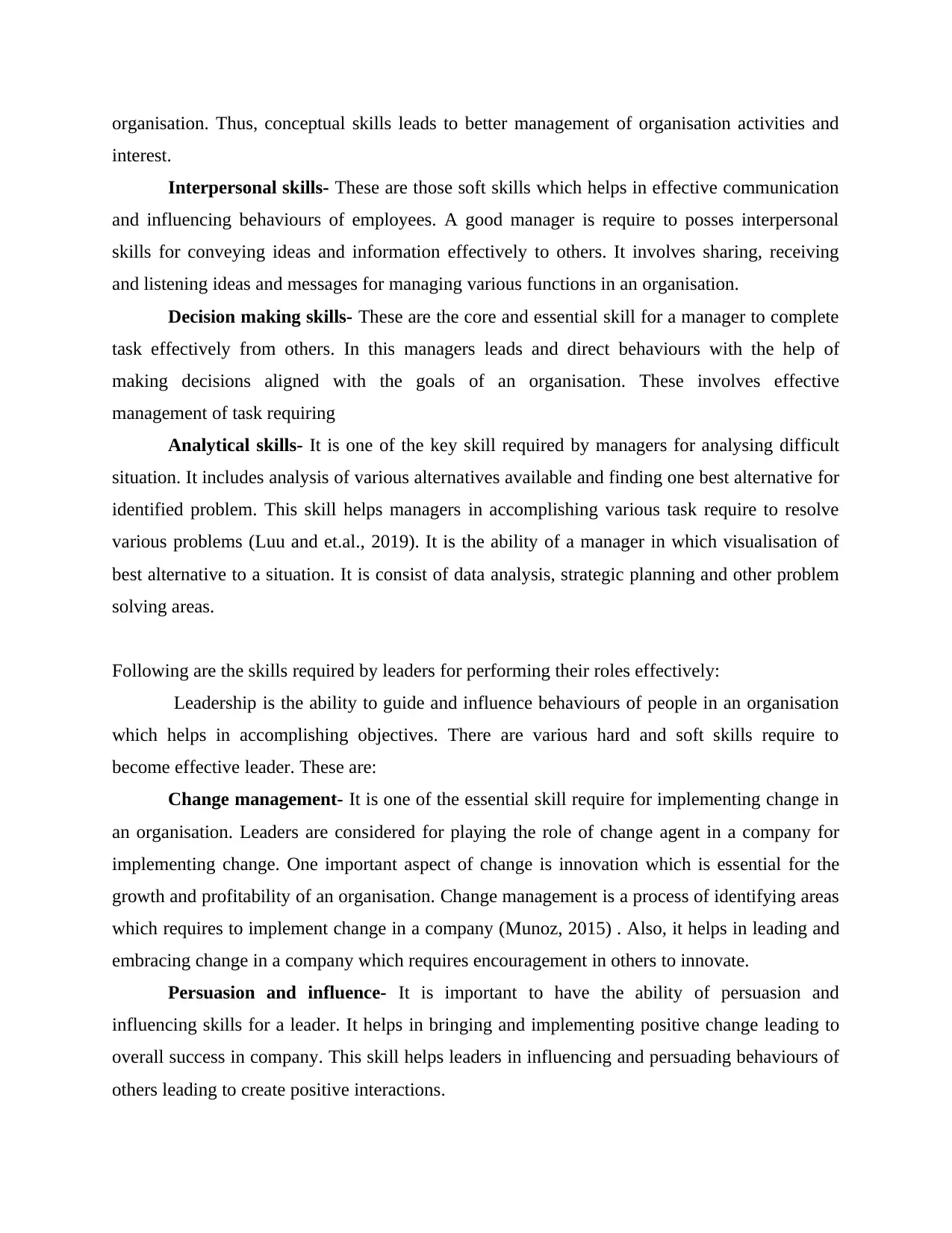
organisation. Thus, conceptual skills leads to better management of organisation activities and
interest.
Interpersonal skills- These are those soft skills which helps in effective communication
and influencing behaviours of employees. A good manager is require to posses interpersonal
skills for conveying ideas and information effectively to others. It involves sharing, receiving
and listening ideas and messages for managing various functions in an organisation.
Decision making skills- These are the core and essential skill for a manager to complete
task effectively from others. In this managers leads and direct behaviours with the help of
making decisions aligned with the goals of an organisation. These involves effective
management of task requiring
Analytical skills- It is one of the key skill required by managers for analysing difficult
situation. It includes analysis of various alternatives available and finding one best alternative for
identified problem. This skill helps managers in accomplishing various task require to resolve
various problems (Luu and et.al., 2019). It is the ability of a manager in which visualisation of
best alternative to a situation. It is consist of data analysis, strategic planning and other problem
solving areas.
Following are the skills required by leaders for performing their roles effectively:
Leadership is the ability to guide and influence behaviours of people in an organisation
which helps in accomplishing objectives. There are various hard and soft skills require to
become effective leader. These are:
Change management- It is one of the essential skill require for implementing change in
an organisation. Leaders are considered for playing the role of change agent in a company for
implementing change. One important aspect of change is innovation which is essential for the
growth and profitability of an organisation. Change management is a process of identifying areas
which requires to implement change in a company (Munoz, 2015) . Also, it helps in leading and
embracing change in a company which requires encouragement in others to innovate.
Persuasion and influence- It is important to have the ability of persuasion and
influencing skills for a leader. It helps in bringing and implementing positive change leading to
overall success in company. This skill helps leaders in influencing and persuading behaviours of
others leading to create positive interactions.
interest.
Interpersonal skills- These are those soft skills which helps in effective communication
and influencing behaviours of employees. A good manager is require to posses interpersonal
skills for conveying ideas and information effectively to others. It involves sharing, receiving
and listening ideas and messages for managing various functions in an organisation.
Decision making skills- These are the core and essential skill for a manager to complete
task effectively from others. In this managers leads and direct behaviours with the help of
making decisions aligned with the goals of an organisation. These involves effective
management of task requiring
Analytical skills- It is one of the key skill required by managers for analysing difficult
situation. It includes analysis of various alternatives available and finding one best alternative for
identified problem. This skill helps managers in accomplishing various task require to resolve
various problems (Luu and et.al., 2019). It is the ability of a manager in which visualisation of
best alternative to a situation. It is consist of data analysis, strategic planning and other problem
solving areas.
Following are the skills required by leaders for performing their roles effectively:
Leadership is the ability to guide and influence behaviours of people in an organisation
which helps in accomplishing objectives. There are various hard and soft skills require to
become effective leader. These are:
Change management- It is one of the essential skill require for implementing change in
an organisation. Leaders are considered for playing the role of change agent in a company for
implementing change. One important aspect of change is innovation which is essential for the
growth and profitability of an organisation. Change management is a process of identifying areas
which requires to implement change in a company (Munoz, 2015) . Also, it helps in leading and
embracing change in a company which requires encouragement in others to innovate.
Persuasion and influence- It is important to have the ability of persuasion and
influencing skills for a leader. It helps in bringing and implementing positive change leading to
overall success in company. This skill helps leaders in influencing and persuading behaviours of
others leading to create positive interactions.
⊘ This is a preview!⊘
Do you want full access?
Subscribe today to unlock all pages.

Trusted by 1+ million students worldwide
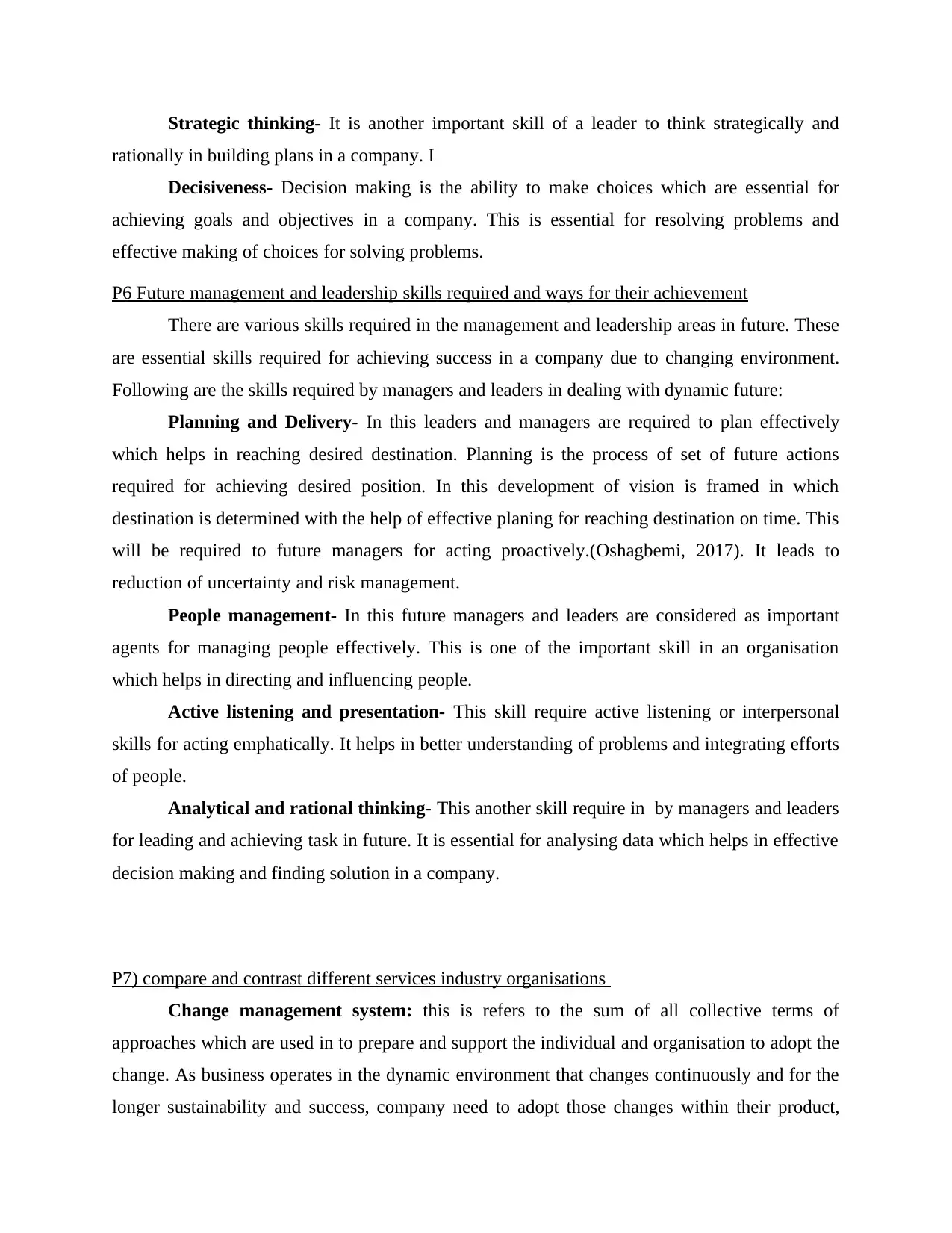
Strategic thinking- It is another important skill of a leader to think strategically and
rationally in building plans in a company. I
Decisiveness- Decision making is the ability to make choices which are essential for
achieving goals and objectives in a company. This is essential for resolving problems and
effective making of choices for solving problems.
P6 Future management and leadership skills required and ways for their achievement
There are various skills required in the management and leadership areas in future. These
are essential skills required for achieving success in a company due to changing environment.
Following are the skills required by managers and leaders in dealing with dynamic future:
Planning and Delivery- In this leaders and managers are required to plan effectively
which helps in reaching desired destination. Planning is the process of set of future actions
required for achieving desired position. In this development of vision is framed in which
destination is determined with the help of effective planing for reaching destination on time. This
will be required to future managers for acting proactively.(Oshagbemi, 2017). It leads to
reduction of uncertainty and risk management.
People management- In this future managers and leaders are considered as important
agents for managing people effectively. This is one of the important skill in an organisation
which helps in directing and influencing people.
Active listening and presentation- This skill require active listening or interpersonal
skills for acting emphatically. It helps in better understanding of problems and integrating efforts
of people.
Analytical and rational thinking- This another skill require in by managers and leaders
for leading and achieving task in future. It is essential for analysing data which helps in effective
decision making and finding solution in a company.
P7) compare and contrast different services industry organisations
Change management system: this is refers to the sum of all collective terms of
approaches which are used in to prepare and support the individual and organisation to adopt the
change. As business operates in the dynamic environment that changes continuously and for the
longer sustainability and success, company need to adopt those changes within their product,
rationally in building plans in a company. I
Decisiveness- Decision making is the ability to make choices which are essential for
achieving goals and objectives in a company. This is essential for resolving problems and
effective making of choices for solving problems.
P6 Future management and leadership skills required and ways for their achievement
There are various skills required in the management and leadership areas in future. These
are essential skills required for achieving success in a company due to changing environment.
Following are the skills required by managers and leaders in dealing with dynamic future:
Planning and Delivery- In this leaders and managers are required to plan effectively
which helps in reaching desired destination. Planning is the process of set of future actions
required for achieving desired position. In this development of vision is framed in which
destination is determined with the help of effective planing for reaching destination on time. This
will be required to future managers for acting proactively.(Oshagbemi, 2017). It leads to
reduction of uncertainty and risk management.
People management- In this future managers and leaders are considered as important
agents for managing people effectively. This is one of the important skill in an organisation
which helps in directing and influencing people.
Active listening and presentation- This skill require active listening or interpersonal
skills for acting emphatically. It helps in better understanding of problems and integrating efforts
of people.
Analytical and rational thinking- This another skill require in by managers and leaders
for leading and achieving task in future. It is essential for analysing data which helps in effective
decision making and finding solution in a company.
P7) compare and contrast different services industry organisations
Change management system: this is refers to the sum of all collective terms of
approaches which are used in to prepare and support the individual and organisation to adopt the
change. As business operates in the dynamic environment that changes continuously and for the
longer sustainability and success, company need to adopt those changes within their product,
Paraphrase This Document
Need a fresh take? Get an instant paraphrase of this document with our AI Paraphraser
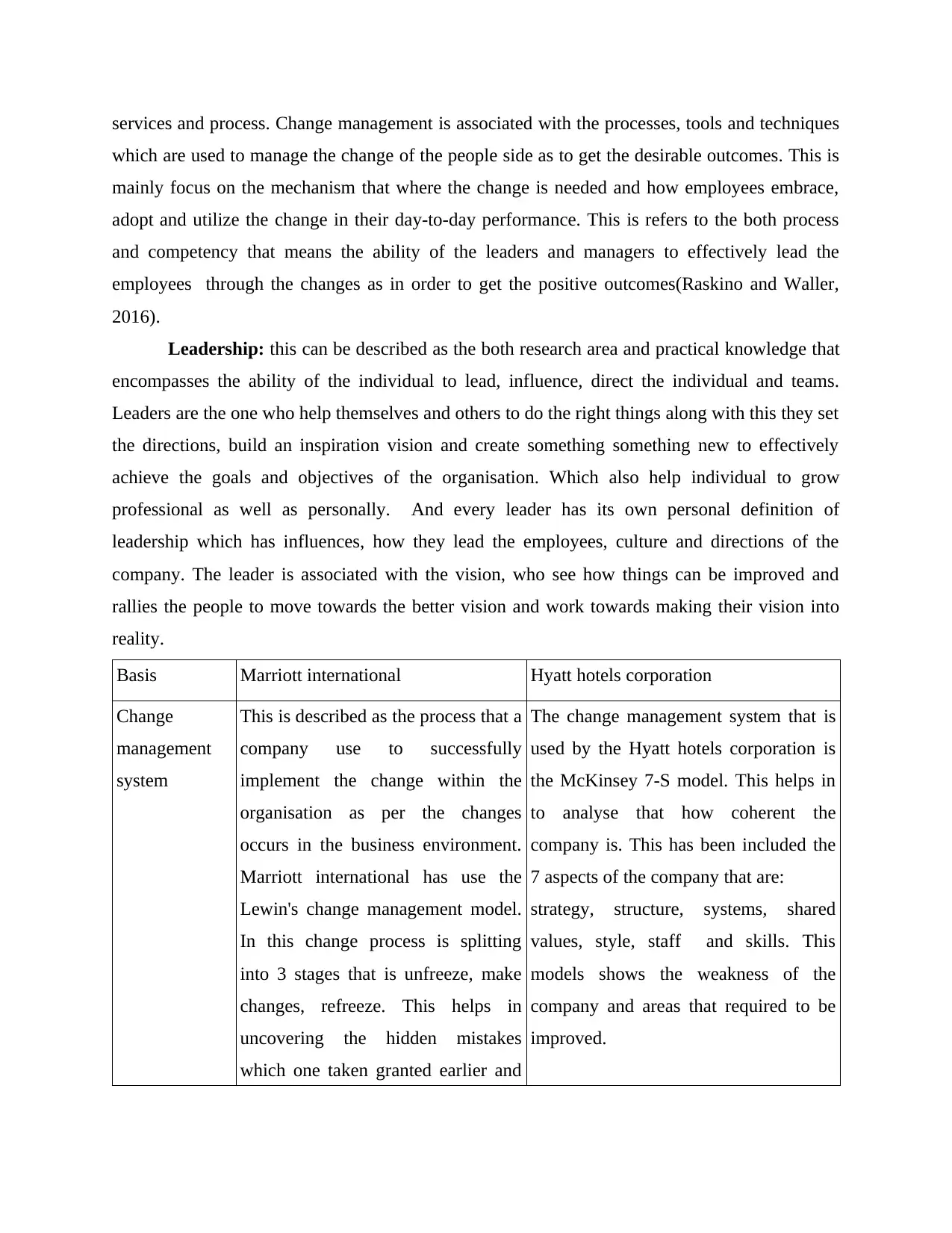
services and process. Change management is associated with the processes, tools and techniques
which are used to manage the change of the people side as to get the desirable outcomes. This is
mainly focus on the mechanism that where the change is needed and how employees embrace,
adopt and utilize the change in their day-to-day performance. This is refers to the both process
and competency that means the ability of the leaders and managers to effectively lead the
employees through the changes as in order to get the positive outcomes(Raskino and Waller,
2016).
Leadership: this can be described as the both research area and practical knowledge that
encompasses the ability of the individual to lead, influence, direct the individual and teams.
Leaders are the one who help themselves and others to do the right things along with this they set
the directions, build an inspiration vision and create something something new to effectively
achieve the goals and objectives of the organisation. Which also help individual to grow
professional as well as personally. And every leader has its own personal definition of
leadership which has influences, how they lead the employees, culture and directions of the
company. The leader is associated with the vision, who see how things can be improved and
rallies the people to move towards the better vision and work towards making their vision into
reality.
Basis Marriott international Hyatt hotels corporation
Change
management
system
This is described as the process that a
company use to successfully
implement the change within the
organisation as per the changes
occurs in the business environment.
Marriott international has use the
Lewin's change management model.
In this change process is splitting
into 3 stages that is unfreeze, make
changes, refreeze. This helps in
uncovering the hidden mistakes
which one taken granted earlier and
The change management system that is
used by the Hyatt hotels corporation is
the McKinsey 7-S model. This helps in
to analyse that how coherent the
company is. This has been included the
7 aspects of the company that are:
strategy, structure, systems, shared
values, style, staff and skills. This
models shows the weakness of the
company and areas that required to be
improved.
which are used to manage the change of the people side as to get the desirable outcomes. This is
mainly focus on the mechanism that where the change is needed and how employees embrace,
adopt and utilize the change in their day-to-day performance. This is refers to the both process
and competency that means the ability of the leaders and managers to effectively lead the
employees through the changes as in order to get the positive outcomes(Raskino and Waller,
2016).
Leadership: this can be described as the both research area and practical knowledge that
encompasses the ability of the individual to lead, influence, direct the individual and teams.
Leaders are the one who help themselves and others to do the right things along with this they set
the directions, build an inspiration vision and create something something new to effectively
achieve the goals and objectives of the organisation. Which also help individual to grow
professional as well as personally. And every leader has its own personal definition of
leadership which has influences, how they lead the employees, culture and directions of the
company. The leader is associated with the vision, who see how things can be improved and
rallies the people to move towards the better vision and work towards making their vision into
reality.
Basis Marriott international Hyatt hotels corporation
Change
management
system
This is described as the process that a
company use to successfully
implement the change within the
organisation as per the changes
occurs in the business environment.
Marriott international has use the
Lewin's change management model.
In this change process is splitting
into 3 stages that is unfreeze, make
changes, refreeze. This helps in
uncovering the hidden mistakes
which one taken granted earlier and
The change management system that is
used by the Hyatt hotels corporation is
the McKinsey 7-S model. This helps in
to analyse that how coherent the
company is. This has been included the
7 aspects of the company that are:
strategy, structure, systems, shared
values, style, staff and skills. This
models shows the weakness of the
company and areas that required to be
improved.
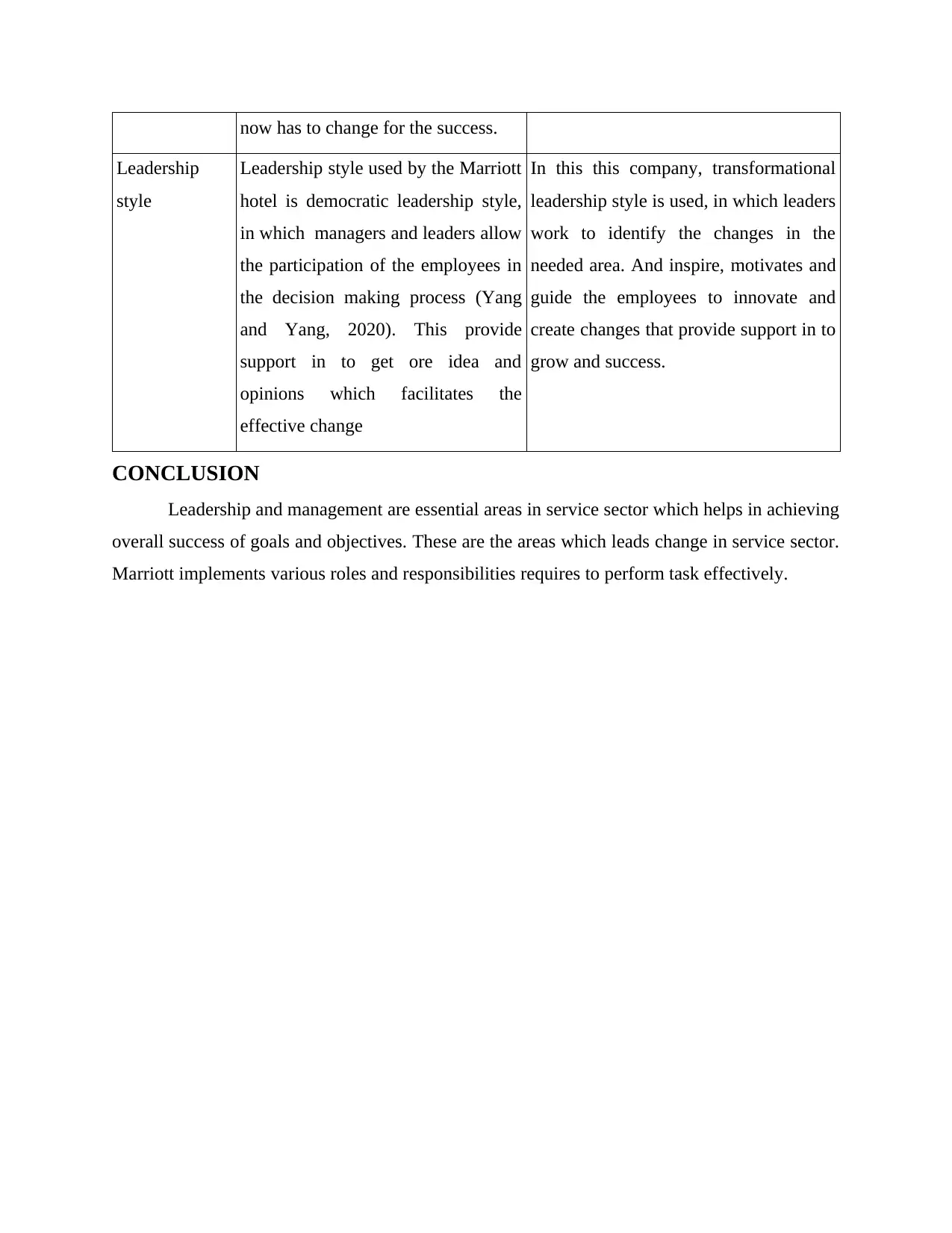
now has to change for the success.
Leadership
style
Leadership style used by the Marriott
hotel is democratic leadership style,
in which managers and leaders allow
the participation of the employees in
the decision making process (Yang
and Yang, 2020). This provide
support in to get ore idea and
opinions which facilitates the
effective change
In this this company, transformational
leadership style is used, in which leaders
work to identify the changes in the
needed area. And inspire, motivates and
guide the employees to innovate and
create changes that provide support in to
grow and success.
CONCLUSION
Leadership and management are essential areas in service sector which helps in achieving
overall success of goals and objectives. These are the areas which leads change in service sector.
Marriott implements various roles and responsibilities requires to perform task effectively.
Leadership
style
Leadership style used by the Marriott
hotel is democratic leadership style,
in which managers and leaders allow
the participation of the employees in
the decision making process (Yang
and Yang, 2020). This provide
support in to get ore idea and
opinions which facilitates the
effective change
In this this company, transformational
leadership style is used, in which leaders
work to identify the changes in the
needed area. And inspire, motivates and
guide the employees to innovate and
create changes that provide support in to
grow and success.
CONCLUSION
Leadership and management are essential areas in service sector which helps in achieving
overall success of goals and objectives. These are the areas which leads change in service sector.
Marriott implements various roles and responsibilities requires to perform task effectively.
⊘ This is a preview!⊘
Do you want full access?
Subscribe today to unlock all pages.

Trusted by 1+ million students worldwide
1 out of 16
Related Documents
Your All-in-One AI-Powered Toolkit for Academic Success.
+13062052269
info@desklib.com
Available 24*7 on WhatsApp / Email
![[object Object]](/_next/static/media/star-bottom.7253800d.svg)
Unlock your academic potential
Copyright © 2020–2026 A2Z Services. All Rights Reserved. Developed and managed by ZUCOL.





